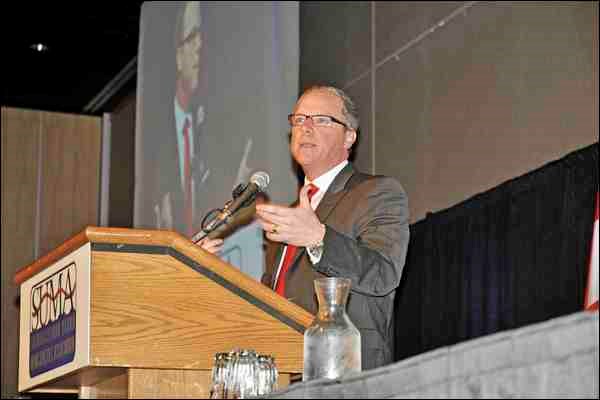Depressed oil prices and discounts to Saskatchewan oil have emerged as a growing concern for the provincial government.
The issue has been a hot topic in recent weeks due to news out of Alberta of pressures on their revenues - and on their provincial budget - because of depressed oil prices, pipeline issues, and Western Canadian crude oil being sold at deep discounts compared to oil from the United States.
Premier Brad Wall acknowledged Saskatchewan faces similar, though not identical, pressures with oil revenues at last week's Saskatchewan Urban Municipalities Convention.
In his speech to delegates at the convention Feb. 4, Wall admitted the province wasn't going to meet a projected four-per cent program-spending target for next year.
"It's going to be less than that because revenues are softening," said Wall. This was despite the fact the economy is still expected to grow according to bank forecasts.
The premier referred in his speech to the issue of the growing price differential between the Western Canadian Select oil coming out of Saskatchewan, compared to the West Texas Crude variety.
West Texas Crude had been selling at $97 a barrel, but Wall spoke of the province's oil being sold at a "double-discount" that drives the price lower.
One discount was applied to the heavy oil that comes out of Saskatchewan because of the need to refine it and upgrade it, while another discount was applied due to a what Wall described as a "lack of pipeline capacity in North America."
That latter point allowed Wall to point to his continued efforts to speak out in support of the Keystone XL pipeline. "We need to move that energy out of this province," said Wall.
Still, despite those pressures, Wall expressed optimism that the 2013 provincial budget will be balanced, noting the province's situation differed from Alberta.
"Our economy is more balanced. Our revenue sources are more balanced. That means we can have a balanced budget, and we will. But there will be tough choices to get there."
In speaking to reporters later, Wall reiterated that despite the softening of revenues the economy was forecast to remain strong.
He also pointed to what happened during the potash price crash of 2009 as an example.
"In '09 we basically saw a crash in revenues but our economy remained very strong," said Wall.
"This time around we see resource revenues softening, reducing, not nearly what we faced in '09 but reducing, but the economy forecast by most all the major banks and prognosticators are one or two (per cent) behind Alberta in growth, but it's still a challenge to the government.
He also acknowledged the discounts posed a challenge. "It means $300 million in oil revenue that we're off," said Wall, but he noted the economy remained strong and pledged his support for continuing with balanced budgets.
The premier told reporters there were some increases coming in other taxation revenues, which he pointed to as a sign the province was diversifying. He also pointed the province's "much more diversified array of natural resources," along with strength in the agriculture and manufacturing sector.
Still, Wall said there was a need to watch spending, and he pledged the government would "err on the side of caution" in building the budget.
The oil price situation was also on the mind of Battlefords MLA Herb Cox last week in North Battleford.
In speaking to a Chamber of Commerce luncheon Feb. 12 Cox acknowledged fluctuating oil revenues were a concern. During a question and answer session Cox defended the practice of the province dipping into the "rainy day" fund, saying it was a good thing to have to offset the variances from resource revenues.
"Resource revenues are going to continue to be up and down," said Cox, who particularly pointed to variances in the price of oil. "It's scary business when you have resource revenues."
When he spoke to reporters Cox acknowledged the financial pressures that come from lower resources revenues.
"They can fluctuate. The prices of commodities are down - potash prices are down, oil prices are down, and that affected us on the revenue side. On the other side, tax revenues are up $314 million. So that absorbed quite a bit of that."
Cox also repeated the government's support for more pipelines to ship oil out of Saskatchewan, including to the west coast as well as Keystone XL.
"Keystone would be a great thing for both sides of the border. You know, Keystone will now also hook into the Bakken field on the south side of the border as well, so it's in the 'States advantage to have it as much as it is ours. I'm really looking forward to an announcement here pretty quick, that that's going to be going ahead."




